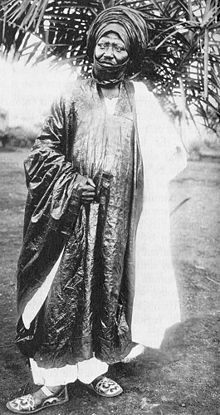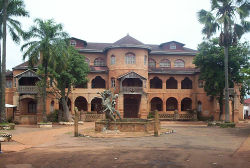- Ibrahim Njoya
-
King Ibrahim Njoya (1860–1933), distinguished ruler, intellectual, and inventor, was 17th in a long dynasty of kings that ruled over Bamum and its people in western Cameroon dating back to the 14th century. He succeeded his father Nsangu (hn-SAH-hn-goo)[1] and ruled from 1886/7 until his death in 1933. He was succeeded on the throne by his son, Seidou Njimoluh Njoya.
Contents
Rule
Njoya's mother, Njapdunke, initially acted as regent until he reached majority. His own official rule was further delayed because his father's head was held by an adversary people. By tradition the head or skull of an ancestor is of ceremonial importance to the Bamum. The Germans would aid him in recovering the head and this, along with their allowing him relative independence, caused him to have generally good relations with them. Although an additional factor seems to have been a belief that fighting the Germans would prove counterproductive to his people. Hence he rejected the resistance proposals of Rudolf Duala Manga Bell.[2]
He also initially tried to adapt Western, and particularly German, ways to his society. In one experiment the uniforms of his soldiers were influenced by an idealized version of those worn by the Hussars. This experiment met with disfavor from Germans who either felt mocked or intimidated by Africans trained and dressed in a German-influenced manner.[3] He also studied Christianity for a time, possibly converting to it and also to Islam at a different point. After this he ultimately created his own religion that mixed Christianity, Islam, and Bamum traditional religion.[4]
Later his relations with the French would prove more negative and he died in exile in Yaounde.
Innovations
Ibrahim Njoya is credited with developing the Bamum script, a syllabic system for writing in the Bamum language. Prior to his reign at the end of the 19th century, the long history of the Bamum people was preserved primarily through oral transmission from one generation to the next in the manner of the African Griot tradition. This was largely true of many other African civilizations of the time. Recognizing the inherent danger of important historical facts being omitted or corrupted, he set out to establish a means of written recording of Bamum history. When his work was completed, his alphabet, called, A-ka-u-ku, contained 73 signs.
Njoya is also credited with having invented a hand-powered mill for grinding corn.
His grandson, Ibrahim Mbombo Njoya, a present-day Sultan in Cameroon and the latest ruler in the Bamoun Dynasty, has established a school in the palace built by his grandfather, in which schoolchildren are once again learning the Bamum script developed by Ibrahim Njoya.
See also
- Bamum people
- Bamum kingdom
Additional reading
A King of Great Accomplishments, Awake! magazine, December, 2007, pp. 26–27.
Web sources
- ^ Cornell
- ^ David McBride, Leroy Hopkins, Carol Blackshire-Belay (1998). Crosscurrents. Camden House. ISBN 1571130985. http://books.google.com/books?id=KX_RdUeUzjEC&pg=PA155&lpg=PA155&dq=%22king+njoya%22&source=web&ots=W3DXLkCRyd&sig=V1N4uCvFAPqeR6y7AaCTcERfpzo#PPA156,M1.
- ^ Ian Fowler, David Zeitlyn (1996). African Crossroads. Berghahn Books. ISBN 1571818596. http://books.google.com/books?id=P5nn6_FIL6sC&pg=PA180&lpg=PA180&dq=%22king+njoya%22&source=web&ots=BVr115xWE-&sig=1ZSOtQrn23umtOIwKWxQYh2ThBw#PPA190,M1.
- ^ John Mukum Mbaku (2005). Culture and Customs of Cameroon. Greenwood Press. ISBN 0313332312. http://books.google.com/books?id=LJbTfGbk-LEC&pg=PA104&lpg=PA104&dq=%22king+njoya%22&source=web&ots=8ZIeoegTqH&sig=4Jy7-AhwGwhtvlzEIAvGamLVuvA#PPA104,M1.
External links
Categories:- 1933 deaths
- Cameroonian traditional rulers
Wikimedia Foundation. 2010.


